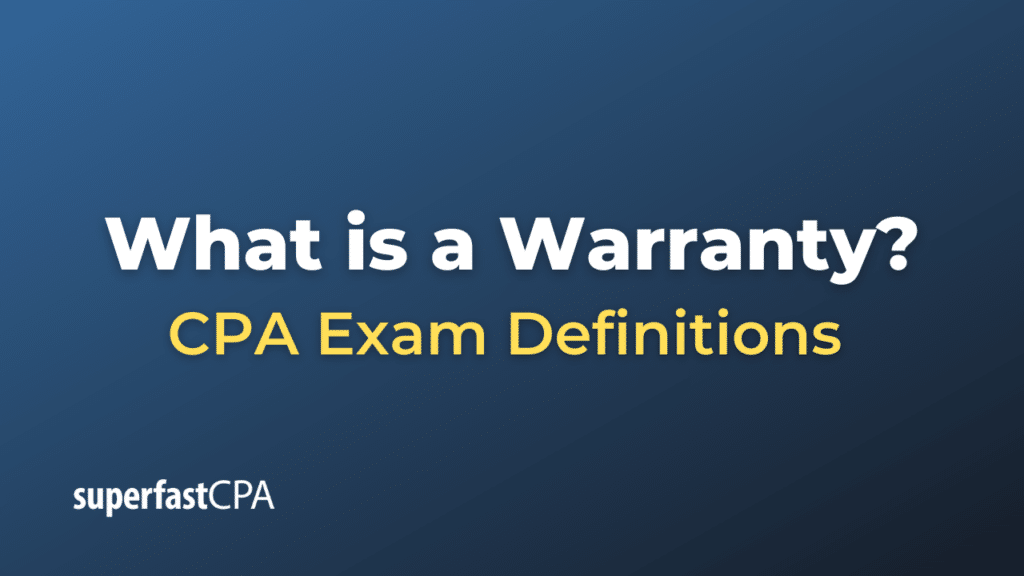Warranty
A warranty is a legally binding commitment forming part of a sales contract whereby the seller assures the purchaser that the product or service being sold meets certain quality and reliability standards. In essence, a warranty is a promise or guarantee given by a manufacturer or seller to a consumer regarding the condition of the product, its features, or even what remedies are available should the product fail to operate as stated.
Warranties can vary widely in scope, duration, and terms, depending on the type of product, the industry, and the manufacturer or seller. They can also be either express or implied:
Express Warranty:
An express warranty is a written or verbal assurance that a product will meet a certain level of quality and reliability. It may include guarantees about the product’s performance, condition, or life expectancy. Express warranties are explicitly stated, either in the user manual, on a certificate, or in the contract.
For example, a new car might come with an express warranty stating that any defects in parts or workmanship will be repaired at no cost to the consumer for the first three years or 36,000 miles, whichever comes first.
Implied Warranty:
An implied warranty is not written or spoken, but is automatically provided by law. There are generally two kinds of implied warranties:
- Implied Warranty of Merchantability: This implies that a product will do what it is supposed to do. For example, a toaster should be able to toast bread.
- Implied Warranty of Fitness for a Particular Purpose: This applies when a seller advises a consumer that a product is suitable for a particular use. For example, if a consumer asks for a paint suitable for outdoor use, the implied warranty is that the paint will withstand outdoor conditions.
Warranties are important both for sellers and consumers. For consumers, they provide a form of protection against faulty products, and for sellers, they can serve as a point of differentiation in the market and can help build trust and brand loyalty. However, it’s crucial for consumers to fully understand the terms and conditions of a warranty, including its limitations and exclusions, to make the most of this protection.
In some cases, warranties can also be extended or supplemented by purchasing additional coverage, often referred to as “extended warranties” or “service plans.” These usually provide for repair or replacement for a period beyond the original warranty but come at an additional cost.
Example of a Warranty
Here’s a simple example illustrating the concept of a warranty:
Scenario: Buying a Laptop
Consumer: Sarah is in the market for a new laptop. She visits an electronics store and talks to a salesperson, who recommends a particular brand and model, assuring her it’s powerful enough for her needs, which include video editing and graphic design.
The Purchase: Sarah decides to buy the laptop. The salesperson informs her that it comes with a one-year express warranty covering defects in materials and workmanship. This means if anything goes wrong due to the laptop’s hardware within one year, repairs or replacements would be provided at no extra cost. The warranty details are also specified in the paperwork that comes with the laptop.
Express Warranty in Action
Situation: Three months after the purchase, Sarah notices that the laptop is overheating and shuts down while she’s using video editing software. She’s frustrated but remembers the warranty.
Action: Sarah contacts the laptop manufacturer’s customer service and explains the problem. They confirm that the issue is covered under the warranty.
Outcome: Sarah sends the laptop for repair, and it gets fixed at no additional cost to her. She receives it back within two weeks, and it works perfectly.
Implied Warranty in Action
Situation: Let’s imagine the salesperson had specifically advised Sarah that this laptop is suitable for heavy video editing tasks. If the laptop wasn’t able to handle those tasks effectively (ignoring the overheating issue), it would likely be a violation of an “Implied Warranty of Fitness for a Particular Purpose.”
Action: Sarah could either seek a replacement or a refund, arguing that the laptop does not meet the standards for the specific purpose she communicated to the salesperson.
Outcome: Depending on jurisdiction and the exact terms discussed, Sarah might be entitled to a refund or replacement under the implied warranty.
Key Takeaways:
- The express warranty provided a clear, formal guarantee regarding the quality and reliability of the laptop.
- The implied warranty, while not explicitly stated, ensured that the product was fit for the particular purpose that the consumer specified.
Warranties offer consumers a level of protection and can significantly influence the buying decision. It’s essential for consumers to understand what is and isn’t covered to avoid surprises later.













